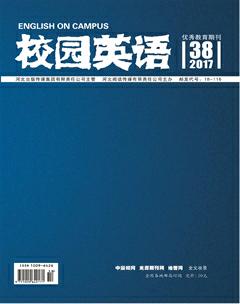Analysis of the Effects of Introversion and Extroversion Personality Traits on Students’ English Reading And Writing Abilities with its Relevant Teaching Advice
李娜
As the English Communicative Teaching Methods popularized, the study of learners non-intelligence factors are taken more and more seriously. A broad sense of non-intelligence focuses on the only non-intellectual factors excluded from all psychological factors; the narrow sense of non-intellectual factors are motivation, interest, feeling, will, personality and so on. There is no doubt that personality is the most important but the most complex factor.
1. An Experiment Study
1.1 Sample of Objects
The sample of this experiment is 22 students selected from 58 students of Class 7 Grade 1 in No.9 Senior High School in Yinchuan, Ningxia Hui Autonomous Region.
1.2 Procedure
1.2.1 Dividing Students into Introvert and Extrovert According to the Questionnaire
The questionnaire has 5 parts representing 5 situations. Each part has 8 items with 3 options:A, B and C. If one chooses A, he can gain zero; if one chooses B, he can obtain one score; if one select C, he can gain two scores. All these rules are just a means to add up the scores of each part.
1.2.2 Testing Students to Gain Marks
Since the samples of introverted students and extroverted students have been got, the next procedure is to obtain the student marks.
1.2.3 Conclusion of the Differences Between the Introverted and Extroverted Students Marks.
The Personality Classification has showed such introvert students as Sun Hang, Zhao Jiaxing, Zhang Nan, and Sun Jun, etc. According to the questionnaire of personality, they usually dont like the noisy places and discuss with each other, furthermore, they are shamed of asking teacher questions and usually feel lonely and speak English very little, but they like to read and recite some articles as well as poems, in addition, most of them usually write dairies. Therefore, their writing skills and reading skills are excellent. Naturally, their relative marks are high (see Table 1).
The extrovert students are Feng Bingkun, Wei Tongge, Zou Fei, Gao Yangyang, etc. According to the questionnaire of personality, they usually like to make many friends and go to the noisy places, also, they prefer to express their own ideas actively and discuss with others freely, of course, they like to speak out English with each other as well. However, they read little and dislike writing dairies unless their teachers ask them to do. Though their ideas in writing are pretty good they cant insist on. They usually make mistakes in grammar. So, we can find from Table 1 that their writing marks are not very high as well as their reading marks.
2. Conclusion
This analysis shows that there are effects of students personality on the English learning, especially their reading and writing skills.
Usually the introverted students excel at language learning, because they have the habits to stay alone and learn actively. Besides they dislike communicating with others and prefer to keep silent. Thus, they are good at developing the Cognitive Academic Language Ability (CALA). However the extroverted students are usually fond of the noisy place to speak out with others and express their own ideas actively. Hence, they are good at developing the Basic Interpersonal Communicative Skills (BICS). The marks we have got proved this fact. Yet, the disparities of their marks are not great at all. Because every kind of personality has their own advantages and disadvantages, both are complementary. Therefore, with different personality traits, the teacher should use different strategies to improve the relevant learning outcomes of students.
References:
[1]Arthur Brooks,Peter Grandyjed.Beginning to Writing.Cambridge:Cambridge University Press,1998.
[2]Robert F.Biehcer,Jack Snowman.“Ericksons theory” Psychology Applied to Teaching 5th ed.(1976):43-45.

